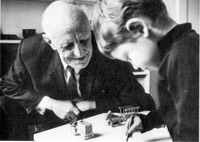Child psychotherapy is the creation of a therapeutic relationship which is almost solely focused on the emotional and social well-being of the child. It differs from adult therapy is several important ways:
THEORIST'S CORNER Donald Winnicott (active from the 1940's - the 1970's & pictured below) was a pediatrician and writer who believed that, as children, we develop a "false self" to accommodate the expectations of powerful adults in our lives and that these false selves can take over our being, creating inner turmoil and emotional confusion. The "true self" is fostered through genuine experiences in which we act and feel as we truly are.

Donald Winnicott and a young patient.
FOCUS OF TREATMENT
Child therapy is very forward-oriented. Children are always in the process of becoming who they will be, so looking back on past life events, as in adult therapy, to find and re-experience the source of trouble or to problem-solve may be somewhat irrelevant. Child therapists are experts at helping children develop a strong sense of self, emotional strength, good relationships and good communication.
LANGUAGE
The language of child therapy is largely non-verbal. Child therapists use activity, unstructured play, games and relationship to communicate with children. Children can't always translate actions into words, or feelings into words, so it's important that child therapists be bilingual, speaking both 'adult' and 'child'.
ENVIRONMENT
This is a busy world, and sometimes children lose track of themselves and need the experience of true "awareness of self" in an environment that is free of criticism (perceived or real) and expectation. Once this trusting relationship is built with a therapist, the exploration of the true self can begin. This exploration happens because of the therapist's ability to create a therapeutic space in which growth and introspection are welcomed and demonstrated. The child psychotherapist is like a guide through the confusing territory of emotion and development.
GOALS
Aside from the relief of symptoms, child therapy works on the following five goals:
● Build Self Esteem
● Help Improve Communication
● Stimulate Development
● Build an Emotional Repertoire
● Improve the Emotional Vocabulary.
